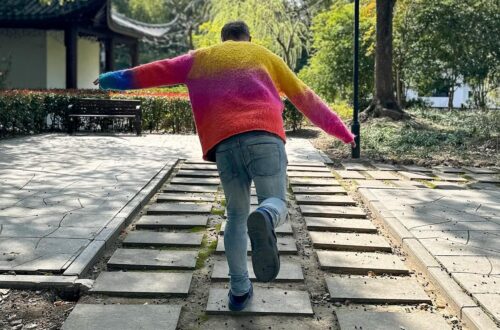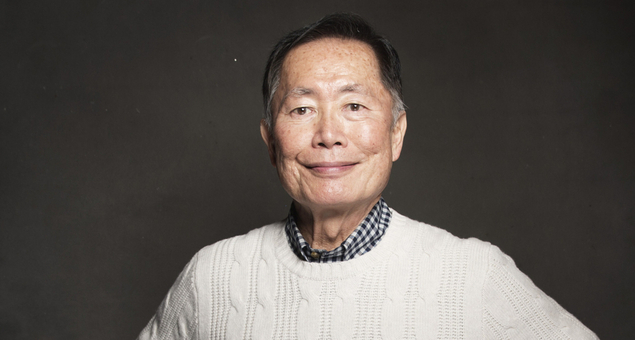
Interview: What’s it like to be Takei.
I’ve interviewed a lot of people over the years working in media. I once interviewed Sia on the phone as she was sitting on a toilet. But my interview with George Takei has always been one of my favourites.
How he said, “Hello Chad” in that famous voice had the sci-fi nerd within giddy with excitement. I still use that sound bite as my ringtone. 15 minutes on the phone with him definitely wasn’t enough when you consider the life he has lived both in front and behind the camera.
Check it out below.
What’s it like to be Takei
At 77, George Takei has lived a rather eventful life. His acting career spans nearly 60 years and includes his iconic role of Mr Sulu in the Star Trek series. He excelled as an actor during a time where Asian actors were rare in Hollywood, pursued a lifetime of social activism, and maintained an incredible social media following.
George Takei is currently touring Australia for the Supanova Pop Culture Expo. Also, the 2014 documentary To Be Takei will take centre stage at the Gold Coast Film Festival this weekend with a special Q&A.
SameSame’s Chad St. James had the privilege of interviewing Mr Takei to discuss the documentary.
As he says “Hello Chad”, in a tone all too familiar from my childhood watching Star Trek reruns in the 80s, I try to resist the urge to go fan crazy. I realise I’m not only talking to one of the most iconic actors of the Star Trek universe but also to a man who’s used his “celebrity status” as a platform to speak out for social justice.
“To be truthful, we are uncontrollably jet-lagged. We arrived yesterday after a 16-hour flight, and right in the middle of the day, we get very, very, very sleepy. And in the middle of the night, we are wide awake staring at the ceiling or looking out the window at the night urban scene”, Takei says surprisingly cheerfully.
“It’s always been a very good visit. Australians are great friends, and it’s always a warm, hospitable greeting that we get”, he says gratefully.
We then talk about his documentary. To Be Takei puts the spotlight on his acting career, his relationship with his partner, and his journey to become one of the biggest internet sensations.
“Filmmaker Jennifer M Croot approached us. We were very flattered. She described to us what she had in mind and we thought it was a wonderful opportunity to have the public see the normality of same-sex couples and so we seized the opportunity”, he explains.
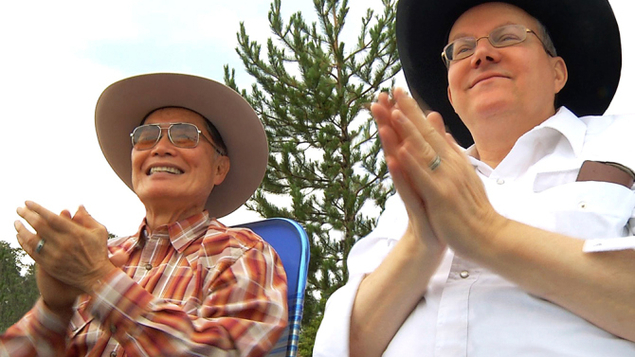
“I’m an actor and have been an actor for over 50 years. So the camera doesn’t daunt me. But for Brad, it was the first time he was the subject of a documentary, and he had some funny moments”, Takei jokes.
When talking about his husband, Takei adds, “He’s very tightly wound, and the documentary captures all that…Sometimes he goes over the top. He steals the documentary, I think.”
To be Takei also gave the actor an opportunity to shed some light on his childhood by offering insights into America’s political and cultural history.
After Japan bombed Pearl Harbour in 1941, approximately 120,000 Americans of Japanese descent were forced into internment camps for the remainder of World War II. Takei and his family were among those interned. He was just 5 years old at the time.
Takei explains, “It was also an opportunity to share something of a rather shameful chapter of American history when Japanese Americans were summarily rounded up with no charges. The central pillar of our justice system disappeared, and we were put into barbed wire prison camps for no other reason than looking like the people that bombed Pearl Harbour.”
“We were behind tall barbed wire fences with sentry towers with machine guns pointed at us. When I made the night runs to the latrine, searchlights followed me. But for five-year-old me, I thought it was nice that they lit the way for me to pee”, he says somewhat jokingly.
But, when he moves onto the topic of his parents, his tone becomes more serious, “But for my parents, it was the most traumatic, anguishing and painful period of their lives…They lost everything. We were innocent people. Our only crime was to be of Japanese ancestry.”
“When the war ended we were literally penniless. It’s a dark and shameful chapter of American history.”
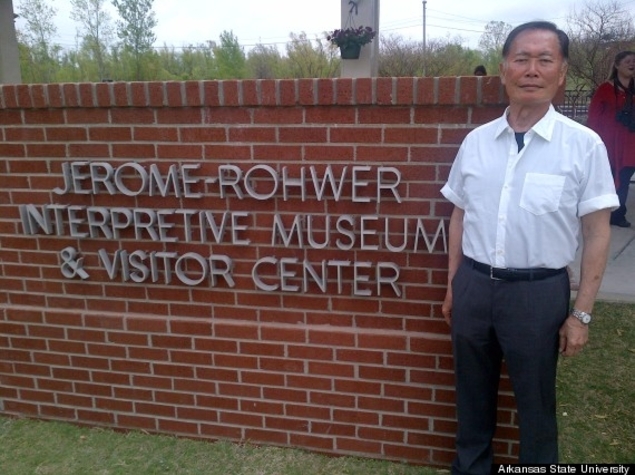
It wasn’t until Takei was about 9 years old, when the war ended, that he left the camp with his family.
“It was a horrific experience…We felt like immigrants coming back to our hometown in Los Angeles.”
Takei then proceeded to tell me about his teenage years and how he developed an interest in politics. Given his experiences as a child, he wanted to learn more about how such things could happen.
“I had long after-dinner discussions with my father, and I learned about American democracy from a man who lost everything in the middle of his life”, he says, reflecting on discussions with his father.
“He told me that our democracy is a people’s democracy, and it can be as great the people can be, but it’s also as fallible as the people are.”
As an adult, Takei became quite active in civil rights advocacy. However, he couldn’t support the one movement that directly affected him: Gay Liberation. Coming out would have cost him his career. It would be many years before he publicly disclosed his sexual orientation.
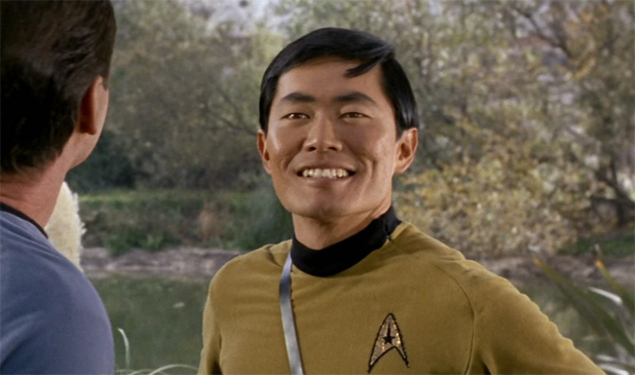
Acting also took him in new directions. In his best-known role, Takei has received critical acclaim as the helmsman of the USS Enterprise, Hikaru Sulu, in the television series Star Trek. He also portrayed the character in six Star Trek feature films.
In 2005, Takei publicly came out in the press as a gay man in response to attempts in California to block same-sex marriage.
The rest, as they say, is history.
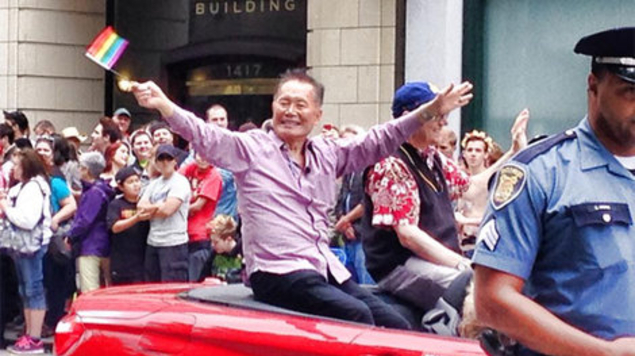
“I try to keep on top of the situation internationally as well as domestically”, he says of his political activism.
“In the US, we had people getting uneasy about the advances we’re making for marriage equality. So, they’ve come up with another way of discrimination: they call it the Religious Freedom Act in Indiana and Arkansas.”
“It’s not been completely resolved. The LGBT people in those states have no protection.”
After already going over time in my interview, I concluded by asking Takei what he personally thought was the biggest hurdle for LGBTI acceptance.
“The challenges are great. Although the Religious Freedom Act has been modified, we still don’t have those protections, and these people are still adamant about not recognising LGBTI people as full citizens. There are efforts to resist marriage equality in certain states”, he explains.
“So we know history moves forward, and advances are made in small increments, and sometimes it’s three steps forward and one step back, but we are making progress. But, we are also mindful of the strong resistance that still exists. It’s been 50 years since the Voting Rights Bill was signed by President Lyndon Johnson, and 50 years later, there’s efforts to suppress voter participation by African Americans and other minorities. So, we’re mindful of the challenges we still face.”



